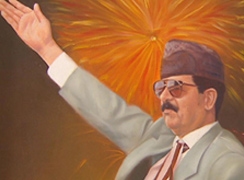The Morning After
How Iraq's 'regime change' was masterminded by the US
 When the US declared its intention to topple Saddam, one question remained unanswered - who would take his place? An excellent and incisive investigative documentary that puts the telling questions to the men and women who dictate US policy. Who will take over in Iraq? Who can maintain control in a country riven with ethnic and political divides? Several candidates jostle for position – all bitterly divided by ethnicity and personality. Essential viewing that highlights how short-sighted US planning was.
When the US declared its intention to topple Saddam, one question remained unanswered - who would take his place? An excellent and incisive investigative documentary that puts the telling questions to the men and women who dictate US policy. Who will take over in Iraq? Who can maintain control in a country riven with ethnic and political divides? Several candidates jostle for position – all bitterly divided by ethnicity and personality. Essential viewing that highlights how short-sighted US planning was.
On London’s Edgware road, tea is sipped and nargilas smoked with more vigour than usual. The mood amongst Iraqi exiles is euphoric. Iraq will soon be liberated. ‘It’s not a question of if but when‘ admits leading US foreign policy advisor Richard Perle. But what will happen afterwards is less clear. "Who's going to replace Saddam? They don't have the slightest idea," says Bob Baer, a former CIA Iraq expert.
Several candidates have stepped forward, all claiming to have support from both the US Government and the Iraqi people.
Sharif Ali Bin Al-Hussein is the man who would be king. A 42nd generation descendent of the prophet Mohammed, his Uncle Faisal II was deposed in 1958. He proposes restoration of the monarchy. ‘From the feedback we get from inside Iraq, that is what they want’ he opines.
But America sees Iraq as becoming the democratic shining light for the whole of the Middle East. ‘we want Iraq to be the example for Iran’ declares policy advisor Daniele Pletka. The preferred candidate for the think tanks that drive US policy is Ahmed Chalabi. Leader of the umbrella opposition group Iraqi National Congress, he has championed liberal democracy and made friends with the Jewish community by proposing peace with Israel. ‘he very much reflects Western values’ approves Richard Perle.
Not everyone agrees. The CIA and State Department are distrustful of him, thinking him too independent. The irony is, he is equally distrusted in the Arab world because of his links to America.
An immediate move to democracy is also seen by some as risky in a country that has never experienced it. 60% of the population is Shia, yet the continuing presence of the predominantly Sunni army would be a thorny issue. "Are they just going to get rid of the army?" asks Bob Baer. Many fear Iraq would disintegrate into three separate states – Shia Muslims, Sunni Muslims and Kurds.
9,500km from Baghdad an Iraqi general sits at a kitchen table and plots the fall of Saddam Hussein. Many believe Iraq needs a ‘strongman’ to hold the country together in the immediate aftermath of Saddam. Najib Al Salih sees himself as that man, exiled to the USA from Iraq after spending 7 years as a Brigadier General under Saddam. But is another military strongman the answer in a region so inclined to despotism and instability?
America is trying to cobble together a coalition that will convince the world it has a plan to stop Iraq falling into chaos if it ousts Saddam Hussein. But the problem is ‘every single one of the candidates believes that he alone is the anointed next leader of Iraq’. and no-one seems able to make a firm decision what will happen next. George Bush has admitted nation building is not his concern, but until a replacement is finally decided upon, can an attack ever be justified?
Produced by ABC Australia
FULL SYNOPSIS
